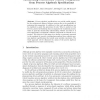Free Online Productivity Tools
i2Speak
i2Symbol
i2OCR
iTex2Img
iWeb2Print
iWeb2Shot
i2Type
iPdf2Split
iPdf2Merge
i2Bopomofo
i2Arabic
i2Style
i2Image
i2PDF
iLatex2Rtf
Sci2ools
129
click to vote
COORDINATION
2006
Springer
2006
Springer
Synthesizing Concurrency Control Components from Process Algebraic Specifications
Process algebraic specifications can provide useful support for the architectural design of software systems due to the possibility of analyzing their properties. In addition to that, such specifications can be exploited to guide the generation of code. What is needed at this level is a general methodology that accompanies the translation process, which in particular should help understanding whether and when it is more appropriate to implement a software component as a thread or as a monitor. The objective of this paper is to develop a systematic approach to the synthesis of correctly coordinating monitors from arbitrary process algebraic specifications that satisfy some suitable constraints. The whole approach will be illustrated by means of the process algebraic specification of a cruise control system.
Arbitrary Process | COORDINATION 2006 | Distributed And Parallel Computing | Process Algebraic Specification | Translation Process |
Related Content
| Added | 20 Aug 2010 |
| Updated | 20 Aug 2010 |
| Type | Conference |
| Year | 2006 |
| Where | COORDINATION |
| Authors | Edoardo Bontà, Marco Bernardo, Jeff Magee, Jeff Kramer |
Comments (0)

